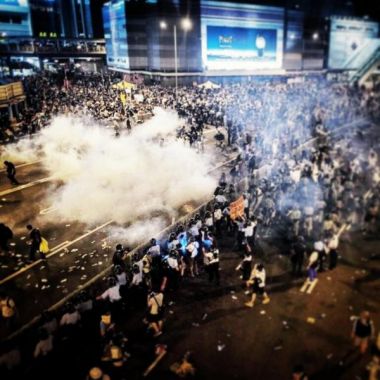Social transformation and the love of God: The power of Christian protest

Recently, my friends and I recounted at what age we became active in public causes. My friend Ben remembers stamping through the puddles in his red boots at the age of four when his parents took him to a 'Ban the Bomb' march. I remember donating my whole bank balance to the Henry Dunant Foundation after watching a program on TV. Forty-six years later, the Henry Dunant Foundation may not remember receiving my life's savings of £7.25, but I certainly do. Reflecting on our youthful activism, we couldn't remember a time when we weren't concerned about the world. Our parents had given us a lens through which we looked at the world – and the freedom to act.
The Bible's wisdom literature teaches us to train children in the way they should go, so that in adult life they will not depart from it (Proverbs 22:6). That such foundations are laid early is exemplified by Joshua Wong, the teenager who is the public face of the Hong Kong protests and co-founder of Scholarism, which kickstarted them.
Wong remembers his father taking him to visit the poor and suffering when he was a child. "He told me that I should care for the abandoned in the city. They had not heard of the gospel, and were living solitary and hard lives," he said in an interiew with the South China Morning Post. He credits his parents with never spoiling him, but giving him the freedom that has shaped him to this very (public) day.
Christians were among the thousands staking out spaces at the front lines of Hong Kong's pro-democracy protests on Wednesday. Catholic, Methodist and Anglican parishes opened their church doors to offer demonstrators a place to eat, sleep, and organised prayer sessions at the protest site. Joseph Cheng Yu-shek, a politics professor at City University of Hong Kong, explains in an interview with UCA news that economic development has not brought more religious tolerance in China. "...in fact in the recent two years persecution has strengthened."
It's good to see the Church out on the street again. This week it is 25 years since 70,000 protesters marched through Leipzig. Weekly 'Prayers for Peace' meetings organised by the pastor of St Nicholas in Leipzg began in 1982. In 1985 this led to a series of peaceful political protests in the city and elsewhere that became known as the Monday Demonstrations. Ignoring death threats and armed police, thousands gathered at St Nicholas Church on 9 October 1989 to pray for peace. The congregation was at the heart of an impromptu march against the communist regime. German historian and author Jens Schöne believes that the prayer meetings were central to the fall of the Berlin wall. Commenting on the prayer movement that brought faith from the pulpit to the pavement, the pastor told the BBC: "We did it because the Church has to do it."
Decades earlier, Martin Luther King Jr took faith into the public square by placing the power of the cross at the centre of the civil rights movement, aiming to redeem the whole of society from the evil of segregation and racism. Their faith in the overcoming power of God's love to create 'a community of the beloved' caused their civil disobedience and fuelled their non-violent subversion. Facing up to injustice, it brought about a seismic shift, affecting moral, social, historical, economic, spiritual and legal dynamics in society.
In our time, it's not merely the young who need to be trained in the ways we should go. We all need to be reminded that the love of God (agape) is the creative, redemptive good will for all men that not only forms the basis for individual salvation but is also a powerful force for social transformation.
Throughout time, the socio-political weakness of the people of God, their position on the margins of society, their functioning within an unjust judicial system, their age or their lack of conventional political power has not been equated with powerlessness. After all, their power is unconventional: God's power rooted in human weakness.
In his book In Praise of Love, the French philosopher Alain Badiou says that the goal of politics is to discover what the collective is capable of. We need to rediscover what the ethic of Christian love is capable of. Jesus' love embodied in his self-sacrificial giving in his death sets high demands for the call upon his disciples, upon our love, lifestyle and engagement with the world. How does it inspire me today in my work, my community? What does it mean to live within the truth? To what frontiers does God's word take me?
I trust that part of the answer lies with the child, the teenager or the adult who has been given a lens by the Creator and has the freedom and passion to contribute to the re-creation of His world.
Marijke Hoek is co-editor of Carnival Kingdom and Micah's Challenge.











